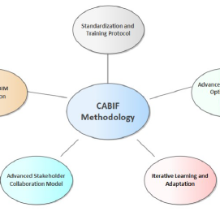This master's thesis thoroughly investigates the impact of Building Information Modeling (BIM) on German railway infrastructure projects, employing a mixed-methods approach involving qualitative insights from expert interviews and quantitative data from online questionnaires and implemented projects. The study assesses BIM's transformative role in enhancing collaboration, reducing errors, and improving project outcomes. By comparing projects using conventional methodologies with those employing BIM, the research identifies key differences in efficiency, error rates, and stakeholder collaboration. The thesis introduces the Comprehensive Adaptive BIM Integration Framework (CABIF), specifically designed for the railway sector, addressing challenges and leveraging opportunities to enhance BIM's practical application. This framework focuses on stakeholder engagement, process standardization, and continuous learning, contributing significantly to the railway infrastructure sector by evaluating current BIM implementation and proposing a forward-looking framework for enhanced application. The findings emphasize BIM's transformative potential but underscore the need for tailored methodologies and ongoing adaptation to project-specific challenges.


